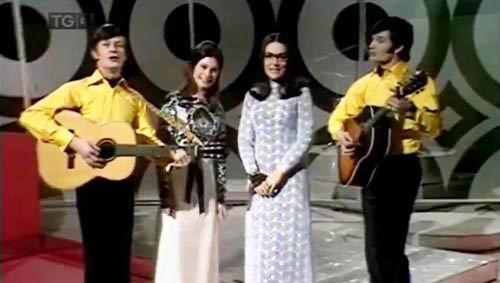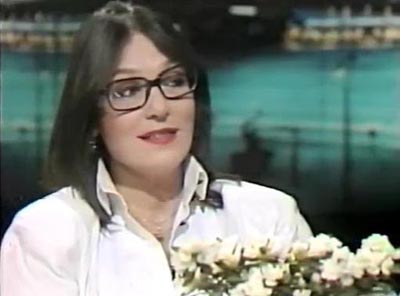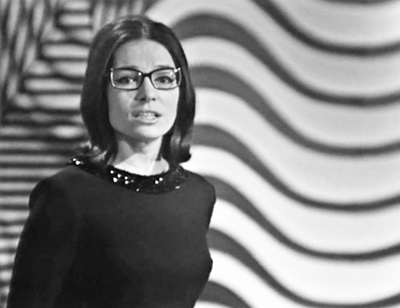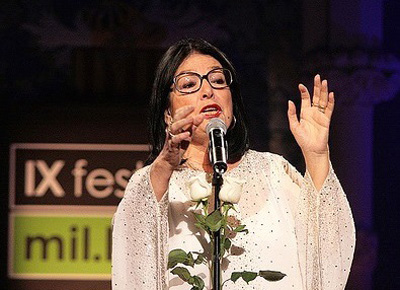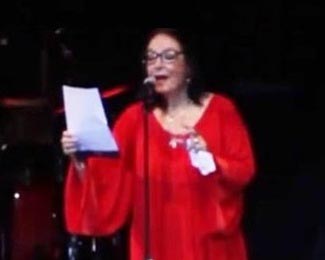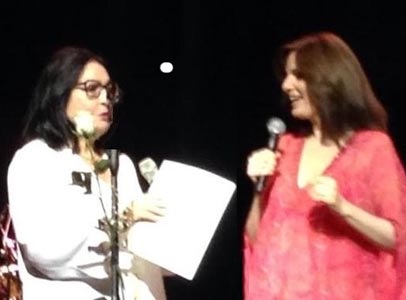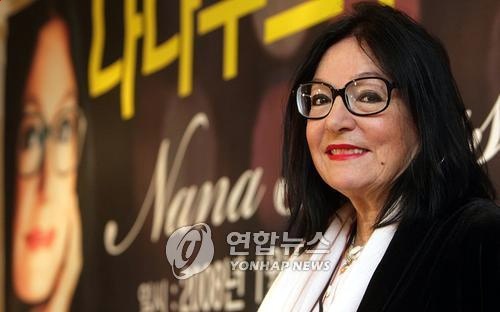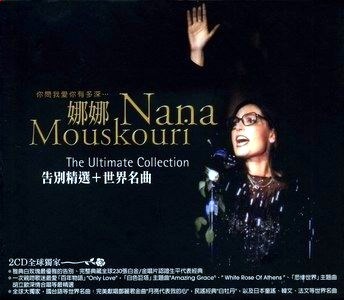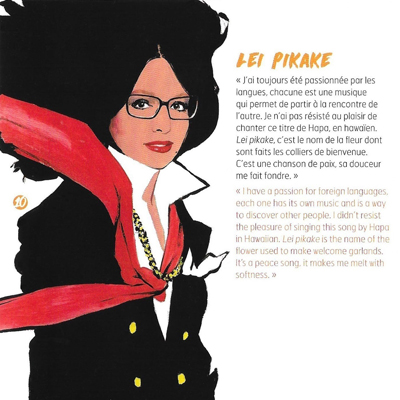The other languages
At the end of her concerts, Nana likes to sing a national song. For example, in Quebec, she chooses "Un Canadien errant" and in Australia "Waltzing Matilda". Where she doesn't speak the language, she writes the lyrics phonetically on a paper and studies the theme. Some of these songs are marketed. Others, unreleased. After presenting her eight repertoires (French, English, Greek, German, Spanish, Italian, Portuguese and Dutch), I dedicate this text to the other languages. Each one is classified according to its origins: Europe, Africa, Asia and Oceania. To these ones are added the vocalizes.
E U R O P E
North
GAELIC
At the time of her BBC TV shows, Nana was interested in the folklore of the British Isles. In 1971, she hosted the ensemble The Pattersons and offered to sing in Gaelic with them. She learned "Báidín Fheilimí" (Feilimí's little boat), a traditional song from the island of Gola, and gave a superb performance. |
|
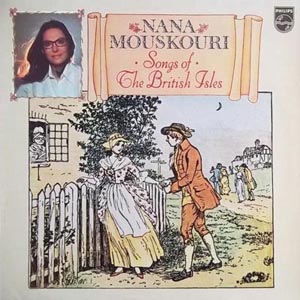 |
WELSH
Nana's repertoire has two Welsh titles. Each one is partly sung in the original language and in English:
"Ar hyd y nos" (All through the night), a choral song translated in several languages sometimes considered as a Christmas Carol. In the first recording, it finishes "All through the night". In the second one, it begins it.
"Suo Gân" (Lullaby) is often adapted for classical performers. It is the first half of "Lullaby".
Both songs appeared in the album "Songs of the British Isles" in 1976. |
DANISH
From 1980, Nana performs in Denmark. Each time, she adds a national song in her program and invites the audience to sing with her.
First, "I Skovens Dybe Stille Ro" (In the deep, still Calm of the Woods), one of the most famous Danish classics.
Then, more often, the lullaby "Den Lille Ole med Paraplyen" (The little Sandman with the umbrella). In 1988, for television, Nana sang an excerpt a capella. |
|
East
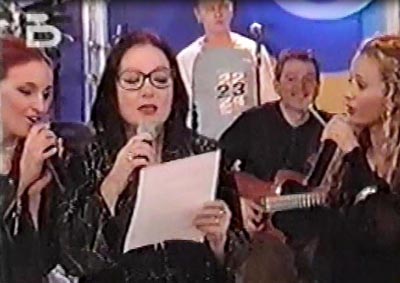 |
BULGARIAN
In 2003, during a visit organized by UNICEF, she participated in a talk show. The host asked her to sing in the language of the country. Nana accepted even if she only had a few hours to learn a song: "More pile, slavey pile" (Sea chicken, night chicken). The two backing singers who accompanied her were surprised of her performance. |
Mediterranean
NEAPOLITAN
During the 60s, Nana traveled regularly to Italy to promote her various singles. It was then that she learned a Neapolitan song: "Io te voglio bene assaie" (I love you so much). Its origins date back to 1839, but it became famous throughout the country in 1956 when the Barython Rino Loddo performed it live on national radio. Nana sang it for the first time in 1967 on Italian television. Although Neapolitan was long considered as a dialect, it is now recognized as a language. |
|
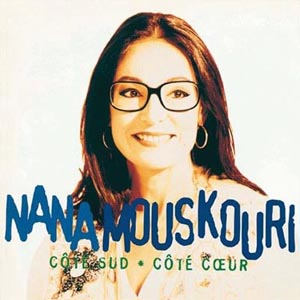
|
CORSICAN
In 1992, Nana gathered several Mediterranean songs in different languages. She chose two in Corsican.
"Barbara fortuna" (Barbara chance), a traditional song evoking the forced departure from the homeland. It is mostly covered by male polyphonic ensembles. The most famous group bears that name and is composed of four members.
"Seri sera" (Seri evening), another polyphonic song, more folksy and festive, often accompanied by violin.
Both songs are on the CD "Côté sud * Côté cœur". |
CATALAN
In 1659, the Treaty of the Pyrenees divided Catalonia in two parts and separated the lovers. A young girl remained on the Spanish side whereas her fiancé was in France. All her dreams flew away with "El rossinyol" (The nightingale) for which frontiers do not exist. Nana learned it by the folk singer Joan Baez. She sang it at the end of her concerts in Barcelona in 2008 and in 2014. The recording, still unreleased on CD, is available for download on Internet. |
|
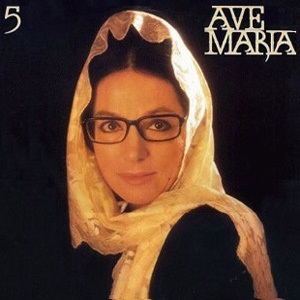
|
LATIN
As fourth Mediterranean language, we could think of Latin. Although this is a dead language, Nana has recorded four songs.
In 1972, two "Ave Maria" were released in a Christmas album. Undoubtedly to preserve the religious character, they were sung in Latin. That international title appears on the cover of some compilations. The first years, Nana sang especially "Ave Maria" (Gounod) in her concerts and on television. In 1999, she re-recorded it. "Ave Maria" (Schubert), more lyrical, has only one original version in Latin. More common, it completed her first classical album. Sometimes Nana sings it almost a cappella, as at the Herod Atticus theatre in 1984. |
In 1987, a third title in Latin came out. "Ave verum (corpus)" (Hail, true Body) evokes the famous prayer of Mozart with music inspired by Carmina Burana by Carl Orff.
Finally, in 1999, for her second classical album, Nana decided to record "Panis Angelicus" (Bread of Angels). That church hymn is covered by the greatest performers.
A F R I C A
ARABIC
For the sake of perfectionism, Nana takes years before deciding to sing in Arabic. "Salma Ya Salama", (Hail Ya Salama), released in 2018, is the work of the singer and songwriter Sayed Darwich. It evokes the Egyptians in search of peace. By recording it, Nana pays tribute to Dalida, whom she admired and who popularized it in several languages in 1977. |
|
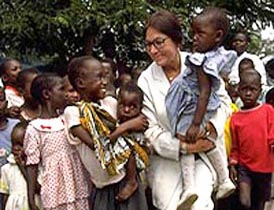 |
SWAHILI
In 1998 and 1999, Nana flew to Kenya to support UNICEF projects. By visiting a school, children taught her "Malaika" (Angel), the most famous song of East Africa. That was popularized worldwide by Miriam Makeba. In 2000, Nana included it in some of her concerts. |
MALAGASY
At the announcement of her unique concert in Madagascar in 2015, Nana promised to perform a song in the local language. She chose "Tsy Hay Hadinoina" (Unforgettable). The spectators, happy, could hardly contain their happiness. That's why her performance was accompanied by intermittent applause. |
|
A S I A
Near East
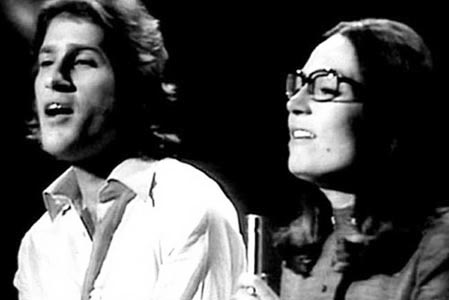 |
HEBREW
In the fall of 1964, for the first time, Nana accompanied Harry Belafonte on a college tour in the United States. They sang in duet the famous Lullaby "Ly la ly la" (Night, night). Four years later, she sang it solo for her series of variety show for the BBC. The following year, in her shows. In 1992, she recorded it. And in 2014, in a concert in Tel Aviv, she sang it in duet with her daughter Lénou.
In the spring 1971, Nana hosted Mike Brant in her TV show. Together, they sang "Erev shel shoshanim" (Evening of roses). Several international artists have recorded that love song. Like the previous one, it's part of her album of Mediterranean songs. |
TURKISH
In 1985, for German television, Nana accepted to join the Turkish rocker Cem Karaca. Each one sang its part of "Opa ni-na-nai" in its native language. It was only in 2014, during her visit to Istanbul, that Nana dared to do it in Turkish with Lénou. It is with pleasure that the fans sang with them "Üsküdar'a gideriken (Kâbitim)" (While going to Üsküdar (My secretary)). That folk song dates back to the Crimean War opposing the Russian Empire and western countries. |
|
Far East
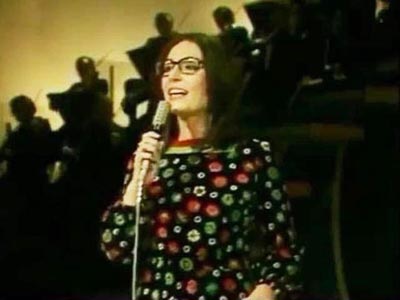
|
JAPANESE
Japanese is usually the first non-European language in which performers make recordings. For Nana, two songs from her repertoire have been adapted: "Sherubûru no amagasa" (The Umbrellas of Cherbourg) and "Kie uselta yu me" (Lost dream), (Translation of "He's gone away").
Also, "Aka Tombo" (Red Dragonfly), a Japanese lullaby. An adult tells that as a child, he saw red dragonflies at sunset. It has been covered by many choirs, symphony orchestras and classical performers. Nana recorded it for a Christmas TV show in 1975. |
KOREAN
In 1987, in a vote, South Koreans choose the most beautiful melodies of the century. The Greek song "Me t'aspro mou mantili" appeared among them. Several performers, accompanied with guitar, add it to their repertoire. For her farewell tour, Nana recorded a version in the national language to thank that public. The title is "Hayan Sohn Su Gun" (White Handkerchief). |
|
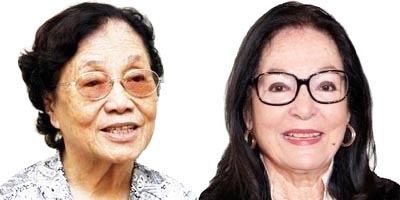 |
VIETNAMESE
In December 1996, Nana, the UNICEF ambassador, was invited to Hanoi for the 50th anniversary of the United Nations. On the ceremony evening, she gave a mini-concert before the Vice President of the Republic, Mrs. Nguyên Thi Bình, the members of her government, the UN representatives and ambassadors. While she started singing "Plaisir d'amour" a cappella, the Vice President joined spontaneously her voice to hers. To thank her, Mrs. Nguyên sang for her a Vietnamese lullaby. To her surprise, Nana returned the favor by singing with her. |
MANDARIN
In 2001, during the concert "Bravo China" which took place in Athens, Nana performed two songs in Mandarin: "Wān wān de yuèliàng" (Crescent moon) in duet with Liu Huan and "Eternal Love" with Liu Huan, Ying Huang and Mario Frangoulis.
In 2008, two titles in that language appeared on the CD 2 "In Asia" from the compilation "The Ultimate Collection": "Bai Mu Dan" (White peony), an old song. Nana performed it in her two concerts in Taipei in 2005. "Yue Liang Dai Biao Wo De Xin" (The moon represents my heart), a success of the famous Taiwanese singer Teresa Teng. |
|
O C E A N I A
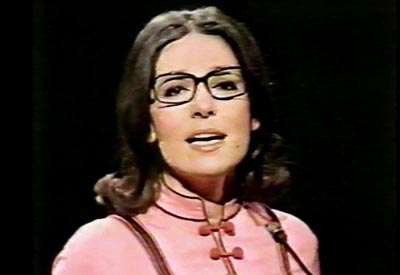 |
MAORI
In 1976, in one of her BBC TV shows, Nana found an original way to greet her New Zealand public. She learned a Maori song: "Haere Mai e nga iwi e" (Welcome all the tribes).
During her tours of 1985 and 2005 in New Zealand, she performed "Pokarekare Ana" (The waves are breaking). That love song became famous during the First World War thanks to the Maori army recruits. Nana learned it by listening to the soprano Kiri Te Kanawa. |
HAWAIIAN
At the suggestion of an American fan, Nana listened to a title from the duo Hapa. Conquered by the sweetness of "Lei pikakei" (Jasmin lei), she decided to include it in her album "Forever young". This melody partially sung A Capella evokes the Hawaiian welcome necklace. Hawaiian is the 19th foreign language sung by Nana. |
|
V O C A L I Z E S
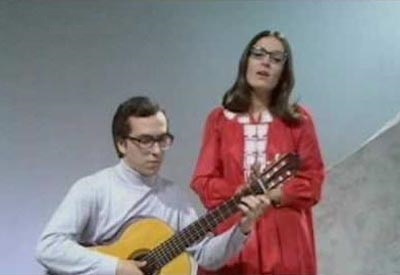 |
Nana's repertoire is so vast that even after having classified her songs by language, there are still titles. These are the ones without words. They are ten.
Nana did a first attempt in 1968 in front of the cameras of the BBC by singing the tune of "Bachianas Brasileiras No 5" with John Williams on guitar. Two years later, she recorded "Epilogue" by Manos Hadjidakis. In 1973, she successfully improvised on "Jazz Scat" for the second French channel. In London, in her 1976 TV series, she accompanied a cappella the vocal ensemble Swingle II on "Bourrée" (Bach). And in her "Numéro un" of 1981, she hummed the melody of "Im Prater". |
In 1985, for her next five albums, Nana adapted the piece of classical guitar "Recuerdos de la Alhambra" by Tárraga. Her voice and her emotion made of it an universal song. It came out on 45 rpm in 11 countries and appeared in her first classical collection which sold millions of copies. A Spanish compilation even bears that name.
Following that international success, several other vocalizes were recorded. In 1988, "The lonely shepherd" with Gheorghe Zamfir and his pan flute and "Adagio" by Albinoni. In 1997, "Romance" from the film "Forbidden Games". And in 1999, "The humming chorus" by Puccini.
A MULTITUDE OF LANGUAGES
During her 60 years career, Nana has sung in a multitude of languages. Herself must ignore the number. With those mentioned in this document, there are 27. But there must certainly be others. Moreover, Nana already reported having sung in Swedish and Russian. Some press articles also mention Iranian and Thai. But as there are not necessarily recordings of these songs, we must therefore continue the research.
